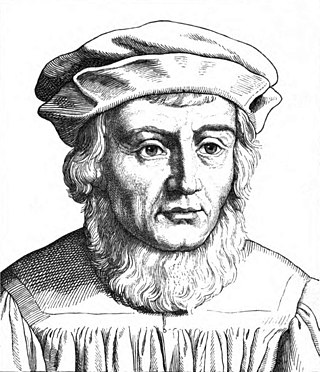Related Research Articles

A dictionary is a listing of lexemes from the lexicon of one or more specific languages, often arranged alphabetically, which may include information on definitions, usage, etymologies, pronunciations, translation, etc. It is a lexicographical reference that shows inter-relationships among the data.

Aulus Gellius was a Roman author and grammarian, who was probably born and certainly brought up in Rome. He was educated in Athens, after which he returned to Rome. He is famous for his Attic Nights, a commonplace book, or compilation of notes on grammar, philosophy, history, antiquarianism, and other subjects, preserving fragments of the works of many authors who might otherwise be unknown today.

William Lily was an English classical grammarian and scholar. He was an author of the most widely used Latin grammar textbook in England and was the first high master of St Paul's School, London.

Giovanni Battista Beccaria was an Italian physicist. A fellow of the Royal Society, he published several papers on electrical subjects in the Phil. Trans. Beccaria was one of Benjamin Franklin's more conspicuous correspondents. His students included Joseph-Louis Lagrange, Giovanni Francesco Cigna, Giuseppe Angelo Saluzzo, and the successor to the Chair of physics, Antonio Vassalli Eandi; moreover, his researches inspired the physicists of Pavia, Alessandro Volta and Luigi Galvani.

Pierre Pithou was a French lawyer and scholar. He is also known as Petrus Pithoeus.
Gaius Valerius Flaccus was a 1st-century Roman poet who flourished during the "Silver Age" under the Flavian dynasty, and wrote a Latin Argonautica that owes a great deal to Apollonius of Rhodes' more famous epic.

Gerrit Janszoon Vos, often known by his Latin name Gerardus Vossius, was a Dutch classical scholar and theologian.
Achilles Tatius of Alexandria was a Roman-era Greek writer of the 2nd century AD whose fame is attached to his only surviving work, the ancient Greek novel, or romance, The Adventures of Leucippe and Clitophon.

Johann Georg Turmair, known by the pen name Johannes Aventinus or Aventin, was a Bavarian Renaissance humanist historian and philologist. He authored the 1523 Annals of Bavaria, a valuable record of the early history of Germany.

Sextus Pompeius Festus, usually known simply as Festus, was a Roman grammarian who probably flourished in the later 2nd century AD, perhaps at Narbo (Narbonne) in Gaul.
The Summa grammaticalis quae vocatur Catholicon, or Catholicon, is a 13th-century Latin dictionary which found wide use throughout Latin Christendom. Some of the entries contain encyclopedic information, and a Latin grammar is also included. The work was created by John Balbi, of Genoa, a Dominican, who finished it on March 7, 1286. The work served in the late Middle Ages to interpret the Bible. The Catholicon was one of the first books to be printed, using the new printing technology of Johannes Gutenberg in 1460.
Catholicon may refer to:

Giovanni Battista Castello was an Italian historical painter.

Valerio Castello born in Genoa, was an Italian painter of the Baroque period and one of the pre-eminent Ligurian painters of his time. His art drew inspiration from a wide range of sources. He painted on canvas and fresco.

Balbi may refer to:
Hieronymus Balbus was a Renaissance Humanist, poet, diplomat, and Bishop of Gurk in Carinthia, b. about 1450 in Venice; d. there, probably 1535.
Nationality words link to articles with information on the nation's poetry or literature.
Papias was a Latin lexicographer from Italy. Although he is often referred to as Papias the Lombard, little is known of his life, including whether he actually came from Lombardy. The Oxford History of English Lexicography considers him the first modern lexicographer for his monolingual dictionary (Latin-Latin), Elementarium Doctrinae Rudimentum, written over a period of ten years in the 1040s. The Elementarium has been called "the first fully recognizable dictionary" and is a landmark in the development of dictionaries as distinct from mere collections of glosses. Papias arranges entries alphabetically based on the first three letters of the word, and is the first lexicographer to name the authors or texts he uses as sources. Although most entries are not etymological, Papias laid the groundwork for derivational lexicography, which became firmly established only a century later.
David Rowland was a Welsh author, best known as the translator of Lazarillo de Tormes.
Samuel Norton (1548–1621) was an English country gentleman and alchemist.
References
![]() This article incorporates public domain material from McClintock, John; Strong, James (1867–1887). Cyclopædia of Biblical, Theological and Ecclesiastical Literature . Harper and Brothers.
This article incorporates public domain material from McClintock, John; Strong, James (1867–1887). Cyclopædia of Biblical, Theological and Ecclesiastical Literature . Harper and Brothers.
- Alessandro Pratesi, «BALBI, Giovanni (Iohannes Balbus, de Balbis, de Ianua)». In: Dizionario Biografico degli Italiani , Volume 5, Roma: Istituto dell'Enciclopedia Italiana, 1963
![]() This article incorporates text from a publication now in the public domain : Herbermann, Charles, ed. (1913). "John of Genoa". Catholic Encyclopedia . New York: Robert Appleton Company.
This article incorporates text from a publication now in the public domain : Herbermann, Charles, ed. (1913). "John of Genoa". Catholic Encyclopedia . New York: Robert Appleton Company.